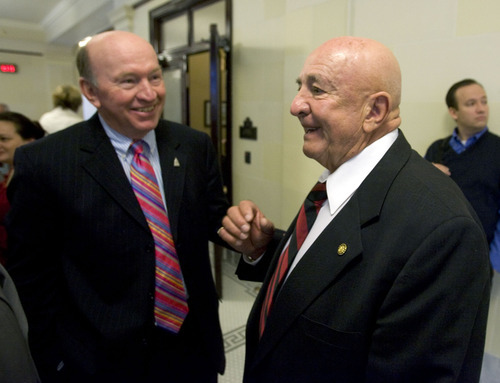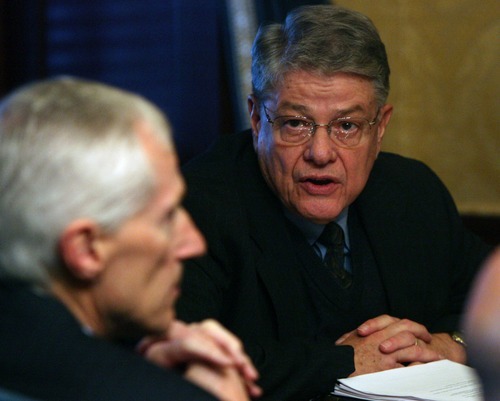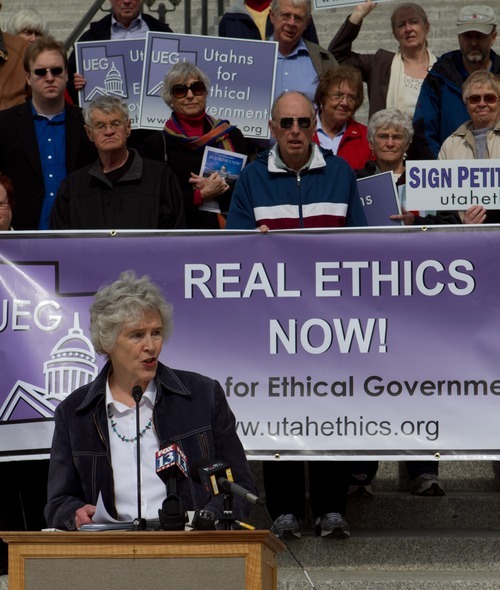This is an archived article that was published on sltrib.com in 2012, and information in the article may be outdated. It is provided only for personal research purposes and may not be reprinted.
In 2008, state Sen. Mike Dmitrich retired from the Utah Legislature. But the former Senate and House minority leader's work on Capitol Hill didn't end.
Dmitrich joined the ranks of former legislators moving through the so-called revolving door to lobbying after losing or giving up their seats; and in 2009, the year after he made the move, the Lobbying Restrictions Act passed the Utah Legislature, restricting state officials from becoming lobbyists for one calendar year after leaving office.
But the law came with a big loophole — waiving the requirement for former state officials who lobby individually or with a company they are associated with, as long as the sole purpose of the business isn't lobbying.
And despite efforts by lawmakers and activist groups, no amendments to tighten that loophole have succeeded.
Maryann Martindale, executive director of the Alliance for a Better Utah, says an enforced waiting period would better prevent people from exploiting public office by using connections made in the Legislature to then — without skipping a beat — benefit themselves or their lobby clients.
"Some of the people who have made that switch were pretty significant players, and they barely have one foot out the door when they come in another with a different hat on," Martindale said.
Not all the approximately 30 lawmakers turned lobbyist made the transition immediately, with some self-imposing a waiting period. But many stepped directly from one role to the other.
Utahns for Ethical Government has been fighting since 2010 to get an initiative on the ballot that would establish an independent ethics commission in Utah. The initiative would ban legislators from being paid lobbyists during their term of service and for two years after leaving office.
"We have a very weak set of ethical standards," the UEG's Dixie Huefner said.
Huefner says problems arise when the influence of longstanding lawmakers, like Dmitrich, carries over into lobbying.
Dmitrich has been working with the lobbying firm Foxley & Pignanelli during legislative sessions for the past four sessions, offering expertise — and contacts — gained as Utah's second-longest-serving legislator.
"After 40 years, like a drug addict, you can't quit cold turkey, so I'm kind of going through a four-year withdrawal," Dmitrich said. "Someone asked me what I miss about the Legislature and I jokingly said the parking spot and the chair."
His switch stayed fairly quiet compared with other lawmakers who became lobbyists between the 2008 and 2009 session — including former state Rep. Mark Walker, who resigned on the eve of an ethics investigation, and House Speaker Greg Curtis, who quickly took to lobbying after his re-election defeat.
Dmitrich says his salary as a lobbyist is better than when he was serving in the Legislature, but his main financial concern is that of his clients. He lists 10 on his registration form.
"You are always lobbying for money," said Dmitrich, who successfully lobbied for funding for the Utah Shakespeare Festival this year. "Money is the issue, and we're no different as lobbyists as someone else [who] is an advocate for education."
The UEG hasn't been alone in trying to reform the revolving-door policies in Utah in recent years.
In fall 2009, the Governor's Commission on Strengthening Utah's Democracy recommended eliminating the lobbying loophole to "flatly prohibit state officials from engaging in all lobbying for compensation for one calendar year after the state official leaves office."
Accordingly, in the 2010 legislative session, Rep. Carol Spackman Moss, D-Holladay, introduced a bill to do just that. The bill failed to make it out of the House.
The issue has been left alone since then, but that doesn't mean critics are resigned to current law.
"Lobbying is not a bad thing in and of itself," Kim Burningham, chairman of UEG and a former lawmaker, said. "Lobbyists perform a valuable service, but there has to be a way to demarcate lawmakers from lobbyists. … People should not have undue influence, and the initiative ensures that those close ties aren't there."
Whether the UEG initiative makes the 2012 ballot is up to a 3rd District judge, who is deciding whether the group's electronic signatures count, as well as determining if they had enough signatures at all.
Martindale, of the Alliance for a Better Utah, says full disclosure is crucial to the lawmaking process, including lobbying.
"The most important things, the most ethical things are to be honest about who you are representing and what you are representing."
And Dmitrich would agree.
"Lobbying is building trust, knowing your issue, and hopefully," said Dmitrich, "persuading a favorable vote." —
Revolving door
The following are registered lobbyists who formerly served in the Legislature:
Brian Allen
Kelly Atkinson
Steve Barth
Lane Beattie
Duane Bordeaux
Craig Call
Holly Christensen
Greg Curtis
Mike Dmitrich
Mont Evans
Cap Ferry
Fred Finlinson
Chris Fox-Finlinson
Jim Gowans
Brent Haymond
Kory Holdaway
Rod Julander
Art Kimball
Susan Koehn
Ted Lewis
Steven Mascaro
Ty McCartney
Craig Moody
Frank Pignanelli
Craig Peterson
Paul Rogers
Lloyd Selleneit
Howard Stephenson*
Dan Tuttle
Mark Walker
Blaze Wharton
* Stephenson is the only sitting legislator registered as a lobbyist.
Source: Utah Lieutenant Governor's Office







